Bethany Lawrence, a UK based osteopath and Panda sleep expert panel member, shares her insights on motion transfer and what to look for in a mattress to get the best night’s sleep.
Do you frequently find yourself pulled out of deep, delicious sleep to find your partner taking another trip to the toilet? You are not alone. Many sleepers experience what is known as ‘motion transfer’ due to their partner’s movements, which can sometimes be a sign you need a new mattress. Though before we get to solutions, let’s take a deeper dive into this bedtime issue that over time can seriously impact your sleep.
Expert insights: Orthopaedic expert, Bethany Lawrence on what is motion transfer
"Motion transfer is the movement from one area of your mattress to the another, there are pros and cons associated with this as per below," says Bethany. If you share a bed with a partner, this can become a real problem especially if your partner constantly changes sleep positions or gets in and out of bed. Sudden movements from your other half to your pet can cause you to wake up, making it notoriously hard to drift back off to sleep. This can often be because a mattress lacks what is known as ‘motion isolation’, which can reduce or even eliminate these disturbances.

How does motion transfer affect the quality of sleep?
When it comes to sleep, we are very different. Motion transfer can be the result of number of reasons, including the mattress support. Bethany explains, "Motion transfer can be affected by sleep conditions i.e restless leg syndrome, sharing a bed with someone on a different sleep schedule affecting motion transfer, and the mattress that you are sleeping on, for example if it lacks the ability to absorb movement it can ultimately affect support, performance and comfort." As mentioned by Bethany, certain sleep conditions can increase the impact of motion transfer. One of these is restless leg syndrome, a mild to severe medical condition that can cause spontaneous movements throughout the night. The type of mattress you are sleeping on can also play a big role in how motion transfer affects sleep.
If your mattress lacks the ability to absorb movement it can severely affect its support, performance, and comfort. So what is best to look for in a mattress to ensure you undisturbed nights of the highest quality, restorative sleep?
What to look for in a mattress to reduce motion transfer?
You may not be able to stop your partner from wiggling or visiting the toilet, though the good news is the right mattress can help. A mattress offering advanced motion isolation is key. Bethany advises: "It is important to look for a mattress that offers advanced motion isolation, adequate spinal support and breathability i.e Panda's Hybrid Bamboo Mattress which contains Biocell™ and OrthoAlign™ foam to isolate movement and maximise comfort for each of your pressure points."
The Hybrid offers a unique solution to motion transfer, combining everything you need for a good night’s sleep in one mattress. Without having to resort to separate rooms a hybrid mattress can help you get better ‘sleep quality, depth, and duration’ without being affected by your partner’s movements.
Motion Transfer- The magic solution
If motion transfer is getting in the way of you and a great night’s sleep, it’s time to upgrade your mattress. While it’s a big decision, finding the perfect mattress will be one of the best bedtime commitments you make. With advanced motion isolation, unparalleled comfort and orthopaedic-grade support a hybrid mattress is most likely to tick all of your boxes!
The magic solution to years of happy sleep is waiting.
FAQs
1. What are some common causes of motion transfer in a mattress?
Several factors can contribute to motion transfer, including the type of mattress, the quality of materials, and the level of support and cushioning. Innerspring mattresses, for example, tend to have higher motion transfer than memory foam or latex mattresses.
2. How can I reduce motion transfer in my mattress?
Consider investing in a mattress designed to isolate motion to reduce motion transfer. Hybrid bamboo mattresses perform well in this regard. Additionally, using a mattress topper, choosing a thicker mattress, or placing the mattress on a sturdy foundation can help minimise motion transfer.
3. Are there specific mattress types or technologies that excel at reducing motion transfer?
Yes, memory foam mattresses are known for absorbing and isolating motion effectively. Hybrid mattresses, which combine memory foam with innerspring coils, can also provide good motion isolation.
4. Can motion transfer be a significant issue for couples sharing a bed?
Yes, motion transfer can be a significant concern for couples. If one partner moves frequently at night, it can disturb the other's sleep. Choosing a mattress with excellent motion isolation can help both partners sleep more soundly.
5. Are there any other factors to consider besides the mattress type?
Factors like mattress thickness, the quality of materials, and the firmness level can also influence motion transfer. A thicker mattress with high-quality foam layers and a medium to firm feel often performs well in reducing motion transfer.
6. Are there any accessories or bedding items that can help further reduce motion transfer?
You can use accessories like motion-isolating bed bases or foundations to complement your mattress. Additionally, a mattress protector or topper can provide an extra cushioning layer and help absorb motion.

![[MattressTopper] Panda London Memory Foam Bamboo Mattress Topper package box](http://pandalondon.com/cdn/shop/files/Bamboo_Mattress_Topper_Package_Box.webp?v=1742301823&width=1500)
![[MattressTopper] Panda London Memory Foam Bamboo Mattress Topper on the floor](http://pandalondon.com/cdn/shop/products/Panda-Memory-Foam-Bamboo-Mattress-Topper-Yoga-e1624045454555.jpg?v=1758795458&width=1000)
![[MattressTopper] Bamboo Mattress Topper Lifestyle Image with Memory Foam Pillows Product Page](http://pandalondon.com/cdn/shop/files/Bamboo_Mattress_Topper_Lifestyle_Image_with_Memory_Foam_Pillows_Product_Page.webp?v=1758795458&width=800)
![[MattressTopper] Bamboo Mattress Topper Lifestyle Image with Bamboo Pillows In the Garden room Product Page](http://pandalondon.com/cdn/shop/files/Bamboo_Mattress_Topper_Lifestyle_Image_with_Bamboo_Pillows_In_the_Garden_room_Product_Page.webp?v=1758795458&width=800)
![[MattressTopper] Panda London Memory Foam Bamboo Mattress Topper side](http://pandalondon.com/cdn/shop/files/Mattress_Topper_Isolated_-_resized.jpg?v=1758795458&width=800)
![[HybridMattressPro] Hybrid_Bamboo_Mattress_Pro_Product_Image_2026](http://pandalondon.com/cdn/shop/files/Hybrid_Bamboo_Mattress_Pro_Product_Image_2026.webp?v=1764944771&width=1000)
![[HybridMattressPro] Breathable Hybrid Bamboo Mattress](http://pandalondon.com/cdn/shop/products/Breathable-Hybrid-Bamboo-Mattress.jpg?v=1764944771&width=1920)
![[HybridMattressPro] Hybrid Bamboo Mattress Pro Cover Zip](http://pandalondon.com/cdn/shop/files/Hybrid_Bamboo_Mattress_Cover.jpg?v=1764944771&width=800)
![[HybridMattressPro] Panda Hybrid Bamboo Mattress Pro](http://pandalondon.com/cdn/shop/files/Hybrid_Bambo_Memory_Foam_Mattress_-_BioCell_Foam_x.jpg?v=1764944771&width=800)
![[HybridMattressPro] Couple on a Hybrid Bamboo Mattress Pro](http://pandalondon.com/cdn/shop/files/Hybrid_Bamboo_Mattress_Couple.jpg?v=1764944771&width=800)
![[CloudDuvet] Panda London The Cloud Bamboo Duvet Packaging](http://pandalondon.com/cdn/shop/products/Panda-London-The-Cloud-Bamboo-Duvet-Panda-Life-scaled_00a651ad-4ca3-4105-b520-12a94c1a4f71.jpg?v=1713363286&width=1920)
![[CloudDuvet] Panda London The Cloud Bamboo Duvet Rolled](http://pandalondon.com/cdn/shop/products/Duvet-Listing-Images03.jpg?v=1764079307&width=1000)
![[CloudDuvet] Panda London The Cloud Bamboo Duvet Girl Huggin a Duvet on the Bed](http://pandalondon.com/cdn/shop/files/Cloud_Bamboo_Duvet_-_Lady_Hugging_it_on_Bed_LifestyleImage.jpg?v=1764079307&width=1000)
![[CloudDuvet] Panda London The Cloud Bamboo Duvet Guy In the Air with Cloud Bamboo Duvet](http://pandalondon.com/cdn/shop/files/GuyonaHybridBambooMattresswithCloudDuvet.jpg?v=1764079307&width=2000)
![[CloudDuvet] Panda Cloud Duvet Winter on the bed lifestyle image](http://pandalondon.com/cdn/shop/files/Panda_Cloud_Duvet_Winter_on_the_Bed_Lifestyle-1_image.jpg?v=1764079307&width=1000)
![[BBWhite] White 100% Bamboo Bedding](http://pandalondon.com/cdn/shop/files/Pure_White_Full_Bed.webp?v=1719581797&width=1000)
![[BBWhite] White 100% Bamboo Bedding Texture](http://pandalondon.com/cdn/shop/files/100_Bamboo_Bedding_-_Pure_White_-_Close_Up_02.webp?v=1762879591&width=1000)
![[BBWhite] White 100% Bamboo Bedding Woman in bed sleeping](http://pandalondon.com/cdn/shop/files/100-Bamboo-Bedding-Set-Pure-White-BB.webp?v=1762879591&width=768)
![[BBWhite] White 100% Bamboo Bedding Woman Duvet cover buttons](http://pandalondon.com/cdn/shop/files/hand_and_buttons_1.webp?v=1762879591&width=1000)
![[BBWhite] White 100% Bamboo Bedding Woman in bed looking and smiling-](http://pandalondon.com/cdn/shop/files/SatonMadeBed-White100_BambooBedding-white_-_BB_SideShot1000x1000.webp?v=1762879591&width=980)
![[BBUrbanGrey] Urban Grey 100% Bamboo Bedding](http://pandalondon.com/cdn/shop/files/Made_Bed_-_Urban_Grey_-_Wide_Shot_2_1_1.webp?v=1762880019&width=1000)
![[BBUrbanGrey] Cloud Duvet Urban Grey 100% Bamboo Bedding Set](http://pandalondon.com/cdn/shop/files/Cloud_Duvet_-_Grey_-_Close_up_2.webp?v=1762880019&width=1000)
![[BBUrbanGrey] Urban Grey 100% Bamboo Bedding Set Woman sitting on the bed](http://pandalondon.com/cdn/shop/files/Sat_in_Bed_-_Grey_100__Bamboo_Bedding_-_Wide_Shot.webp?v=1762880019&width=1000)
![[BBUrbanGrey] Urban Grey 100% Bamboo Bedding Set Woman Duvet buttons Panda London](http://pandalondon.com/cdn/shop/files/hand_buttons_grey_bedding_1.webp?v=1762880019&width=1000)
![[BBUrbanGrey] Woman Sitting on the Bamboo Bedding with coffee](http://pandalondon.com/cdn/shop/files/SatonMadeBed-White100_BambooBedding-SideShot1000x1000.jpg?v=1762880019&width=1000)
![[BBNavyBlue] Deep Sea Navy Blue 100% Bamboo Bedding](http://pandalondon.com/cdn/shop/files/Made_Bed_-_Navy_-_Wide_Shot_3_copy.webp?v=1762879591&width=1000)
![[BBNavyBlue] Deep Sea Navy Blue 100% Bamboo Bedding Texture](http://pandalondon.com/cdn/shop/files/Cloud_Duvet_-_Navy_-_Close_up_2.webp?v=1762880019&width=1000)
![[BBNavyBlue] Deep Sea Navy Blue 100% Bamboo Bedding Woman Sitting on the bed](http://pandalondon.com/cdn/shop/files/Sat_Up_in_Bed_-_Navy_100__Bamboo_Bedding_-_Hands_on_Bed.webp?v=1762880019&width=1000)
![[BBNavyBlue] Deep Sea Navy Blue 100% Bamboo Bedding Duvet Cover Buttons](http://pandalondon.com/cdn/shop/files/Cloud_Duvet_Cover_Buttons_-_Deep_Sea_Navy.webp?v=1762880019&width=1000)
![[BBNavyBlue] Deep Sea Navy Blue 100% Bamboo Bedding Woman sitting on the bed looking away](http://pandalondon.com/cdn/shop/files/SatonMadeBed-White100_BambooBedding-SideShot1000x1000-001.webp?v=1762880019&width=980)
![[BBPink] Vintage Pink Blue 100% Bamboo Bedding](http://pandalondon.com/cdn/shop/files/Made_Bed_-_Pink_-_Wide_Shot_copy.webp?v=1762879591&width=1000)
![[BBPink] Vintage Pink Texture 100% Bamboo Bedding](http://pandalondon.com/cdn/shop/files/Cloud_Duvet_-_Pink_-_Close_up_2.webp?v=1762880019&width=1000)
![[BBPink] Vintage Pink Woman Sitting on the 100% Bamboo Bedding](http://pandalondon.com/cdn/shop/files/Sat_Up_in_Bed_-_Pink_-_Hands_on_Bed.webp?v=1762880019&width=1000)
![[BBPink] Vintage Pink Woman Sitting on the 100% Bamboo Bedding Duvet Cover](http://pandalondon.com/cdn/shop/files/Cloud_Duvet_Cover_Buttons_-_Vintage_Pink.webp?v=1762880019&width=1000)
![[BBPink] Vintage Pink Woman Sitting on the 100% Bamboo Bedding Woman looking far away](http://pandalondon.com/cdn/shop/files/SatonMadeBed-White100_BambooBedding-SideShot1000x1000-001_Vintage_Pink.webp?v=1762880019&width=980)
![[BBGrey] Light Grey 100% Bamboo Bedding](http://pandalondon.com/cdn/shop/files/Made_Bedding_in_Bedroom_-_Urban_Grey_-_Wide_Shot.webp?v=1762879591&width=1000)
![[BBGrey] Light Grey 100% Bamboo Bedding texture](http://pandalondon.com/cdn/shop/files/Texture17.webp?v=1762880019&width=1000)
![[BBGrey] Light Grey 100% Bamboo Bedding with Woman smiling](http://pandalondon.com/cdn/shop/files/Sat_Up_in_Bed_-_Grey_-_Hands_on_Bed.webp?v=1762880019&width=1000)
![[BBGrey] Light Grey 100% Bamboo Bedding with Duvet Cover buttons](http://pandalondon.com/cdn/shop/files/Cloud_Duvet_Cover_Buttons_-_Quiet_Grey.webp?v=1762880019&width=1000)
![[BBGrey] Light Grey 100% Bamboo Bedding with Woman smiling and sitting coffee](http://pandalondon.com/cdn/shop/files/SatonMadeBed-White100_BambooBedding-SideShot1000x1000-002-_Grey.webp?v=1762880019&width=980)
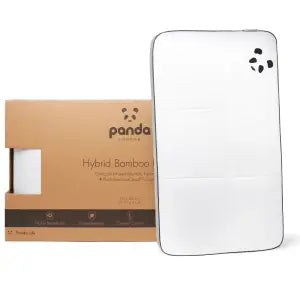 Hybrid Bamboo Pillow
Hybrid Bamboo Pillow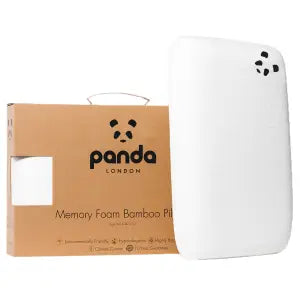 Memory Foam Bamboo Pillow
Memory Foam Bamboo Pillow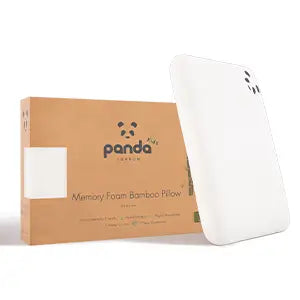 Kids Memory Foam Bamboo Pillow
Kids Memory Foam Bamboo Pillow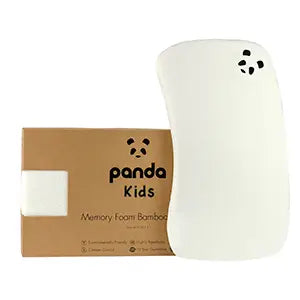 Baby Memory Foam Bamboo Pillow
Baby Memory Foam Bamboo Pillow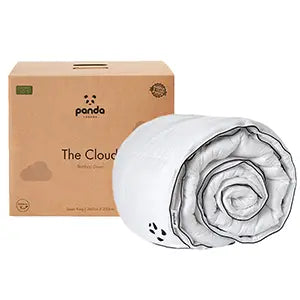 Panda Cloud Duvet
Panda Cloud Duvet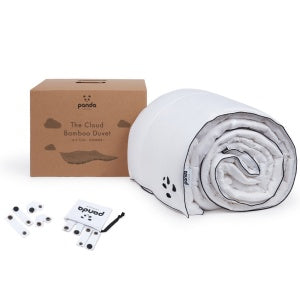 Bamboo Summer Duvet
Bamboo Summer Duvet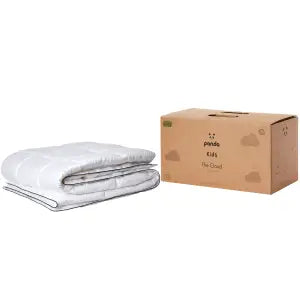 Kids Cloud Duvet
Kids Cloud Duvet
![[HybridPillow] Hybrid Bamboo Pillow - Mattress Campaign](http://pandalondon.com/cdn/shop/products/Hybrid-Bamboo-Pillow-Mattress-Campaign.jpg?crop=region&crop_height=1615&crop_left=152&crop_top=0&crop_width=1615&v=1771199164&width=1920)
![[HybridPillow] Hybrid Pillow with Panda brand marking](http://pandalondon.com/cdn/shop/products/Hybrid-Pillow_8.jpg?v=1771199164&width=1920)
![[HybridPillow] Couples laying on Hybrid Bamboo Pillows](http://pandalondon.com/cdn/shop/files/Hybrid_Bamboo_Pillow_Product.jpg?v=1771199164&width=1000)
![[HybridPillow] Red Hair Girl sleeping on a Hybrid Bamboo Pillow](http://pandalondon.com/cdn/shop/files/Hybrid_Bamboo_Pillow_-_Red_Hair_Girl_Product.jpg?v=1771199164&width=1000)
![[HybridPillow] Guy Hugging Hybrid Bamboo Pillow](http://pandalondon.com/cdn/shop/files/Hybrid-Bamboo-Pillow-Man-holding-the-pillow-1024x1024_jpg.webp?v=1771199164&width=1024)
